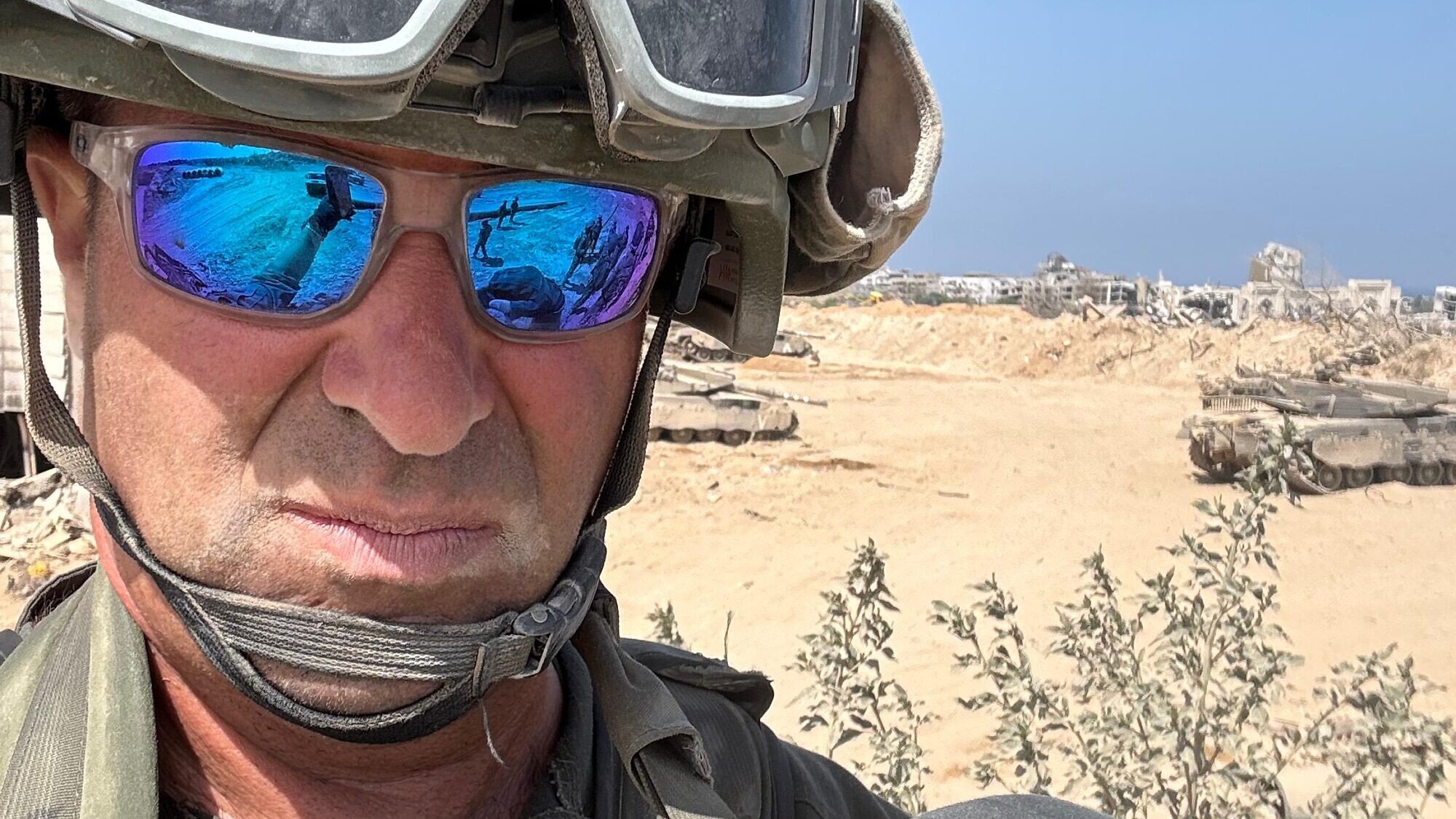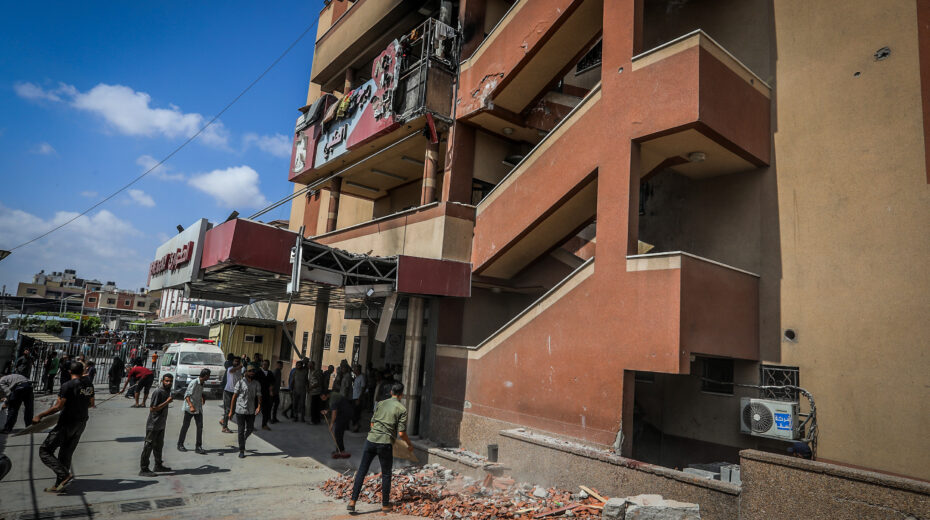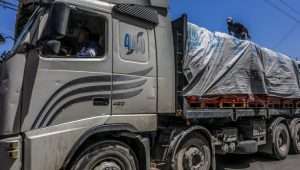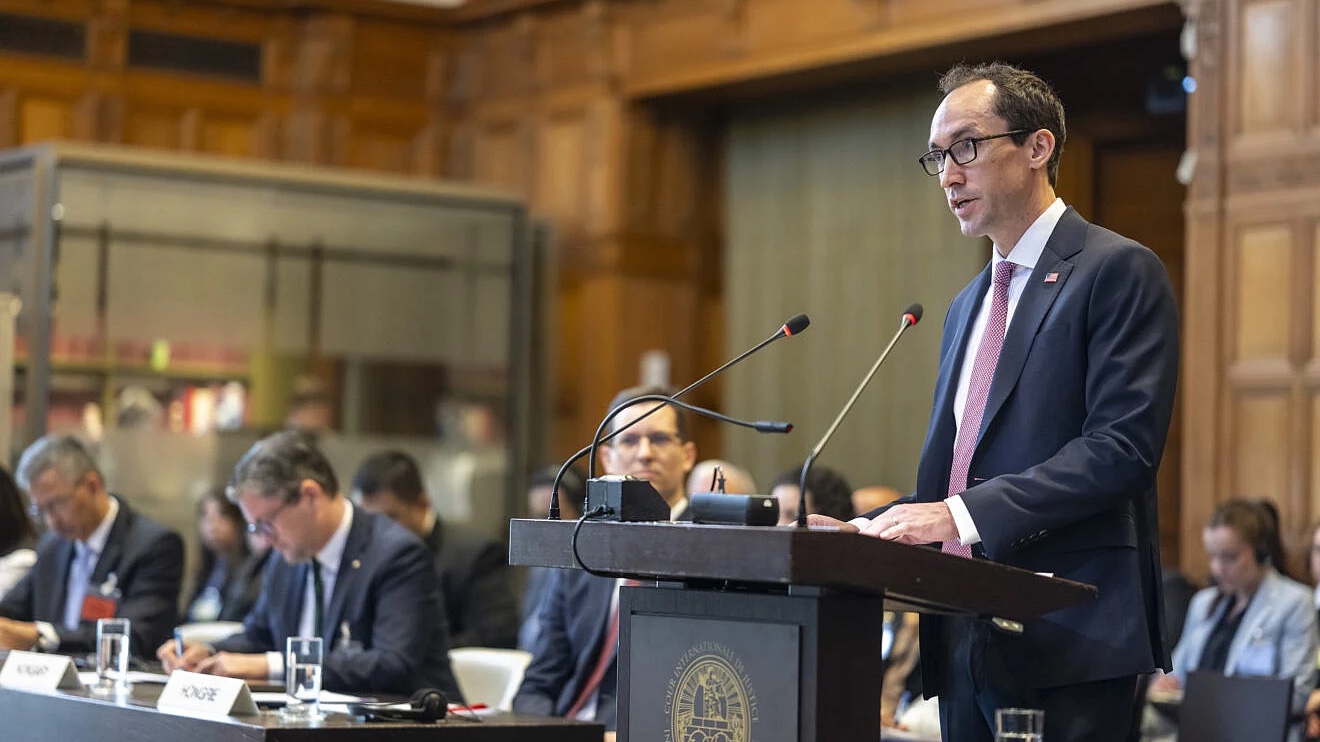(JNS) When Hamas terrorists stormed into southern Israel on Oct. 7, 2023, Dr. Tuvia Book—a popular tour guide, educator and writer—didn’t hesitate. At 55, the former IDF combat medic who had not served in uniform for 15 years felt compelled to return to the military to fight for his country.
“’Never again’ was supposed to mean never again,” he told JNS in a studio interview on Oct. 30. “My first thought was: what can I do? The first mitzvah the Jews received was ‘Lech lecha‘—to go and act. It’s not enough to talk the talk; you have to walk the walk.”
Book found his old army uniform, packed a small backpack and drove south a day later from his home in Modi’in to an IDF base in the Negev. “The uniform still fit, which was unbelievable,” he said. “After some negotiating, I got onto the base and started looking for a unit that would take me.”
He talked his way into a special combat medical extraction team known as PALMAR Asaf, which worked alongside the IDF’s air-rescue unit. The team, he said, “revolutionized battlefield medicine” during the war.
“Our idea was to break the ‘golden hour’ rule,” Book said. “People used to think it was impossible to get a wounded soldier from the battlefield [in Gaza] to an operating room [in Israel] in less than an hour. We proved that’s not true.”
PALMAR’s approach—combining speed, technology and teamwork—saved countless lives. Among them was a well-known Israeli singer and actor, Idan Amedi, 35, who played an undercover agent in the award-winning Fauda TV series and was serving in Gaza as a reservist.
“In January [2024], we were called to a mass-casualty event in Gaza,” Book recalled. “The scene was catastrophic. When we arrived, one of the bodies lying among the fallen turned out to be Idan Amedi.”
The Israeli star was seriously wounded in an explosion in Khan Yunis that killed six IDF soldiers from his Engineering Corps reserve unit.
At first, Book and his team assumed Amedi was dead. “His shirt was torn open, his tags were gone, and there was no sign of life,” Book recalled. “Then one of the doctors found a faint pulse. We opened his airway manually, stabilized him and managed to evacuate him on the third helicopter. We marked him as ‘Anonymous 27.’ Only later did we discover who he was.”
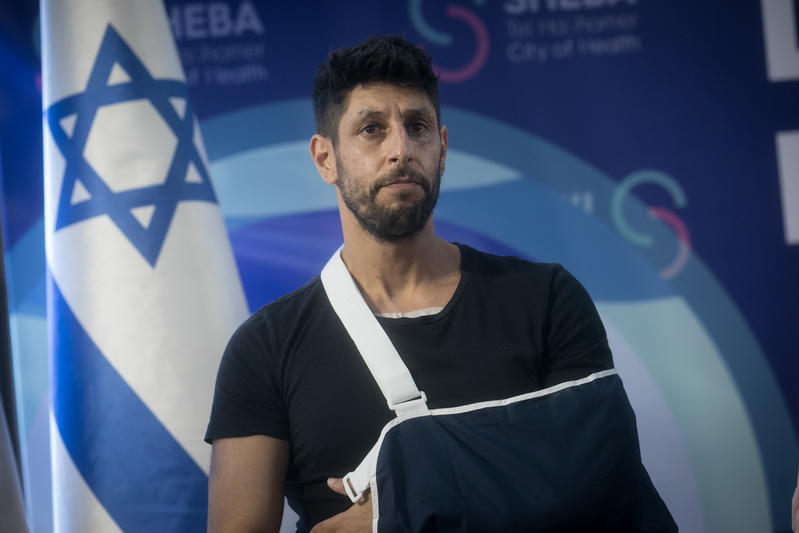
Israeli actor, singer-songwriter, and reserve soldier Idan Amedi, who was seriously injured in the Gaza Strip, attends a press conference upon his release from the Sheba Medical center on January 25, 2024. Photo by Miriam Alster/Flash90
After a year in recovery, Amedi began performing again in Jerusalem, calling Book up to the stage. “Tuvia, to you and all the dear people [of IDF rescue units], thanks to whom I can stand on this stage, we love you!” Amedi declared to warm applause.
“It was emotional,” Book recalled, adding modestly, “That’s what we’re there for—to save lives.”
Lone soldier, educator, tour guide, storyteller
Book’s accent reveals his unusual background. Born in the UK, his parents raised him between Britain and South Africa. “My father was a rabbi, so we moved around every few years,” he said. At 17, he came to Israel for a gap year with Bnei Akiva—and never looked back.
He joined the Givati Brigade as a lone soldier, later becoming a licensed tour guide and a qualified teacher with a doctorate in education. He taught at the Alexander Muss High School, now under the auspices of Jewish National Fund-USA, and wrote extensively on Jewish history and Zionism. He authored and illustrated the internationally acclaimed book, For the Sake of Zion: A Curriculum of Israel Studies, and a historical series titled Jewish Journeys.
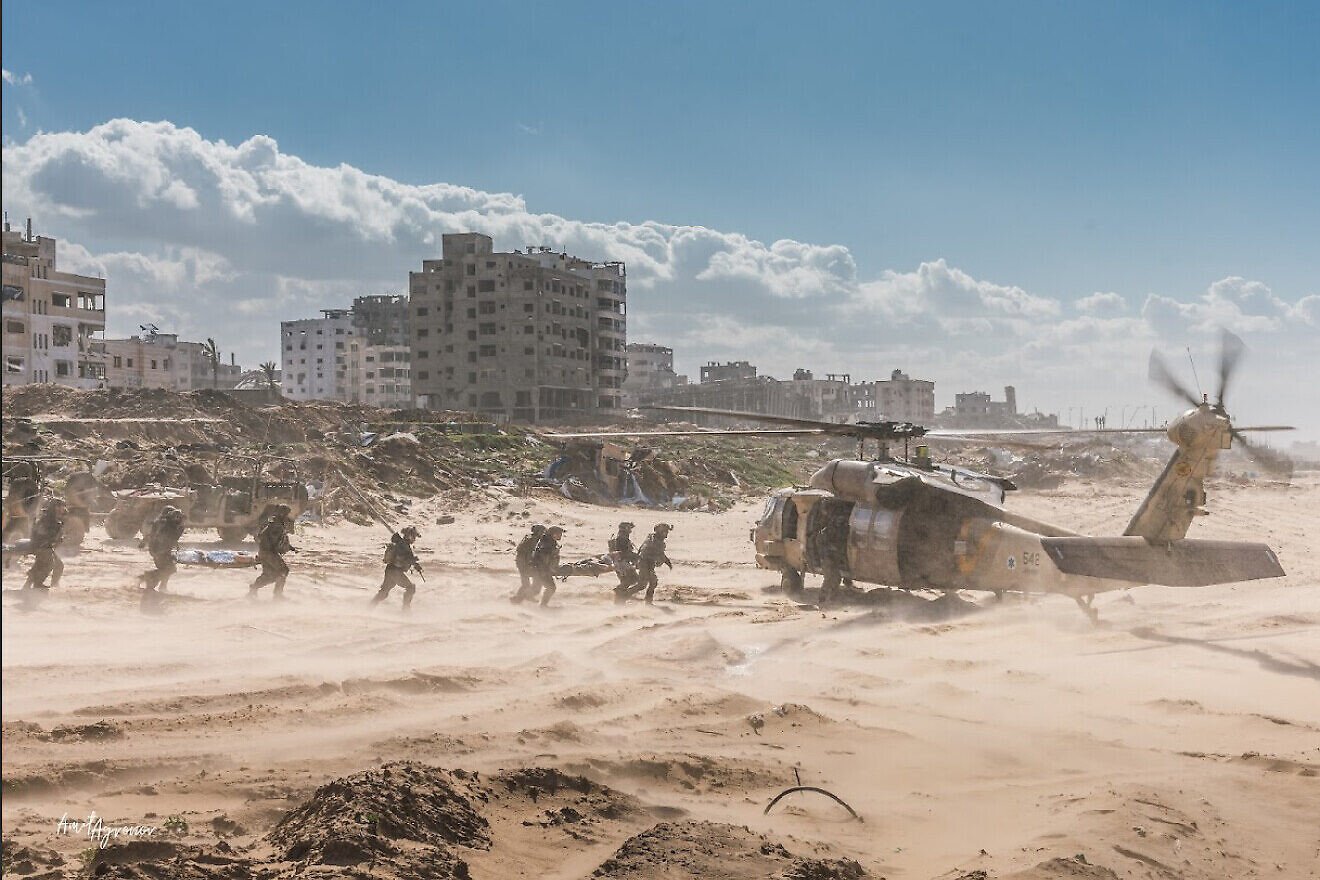
Tuvia Book’s PALMAR Asaf medical extraction unit, retrieving wounded soldiers from inside Gaza, 2024. Credit: Tuvia Book.
His new book, due to be published soon by the Jerusalem-based Gefen Publishing House, is titled Heroes of PALMAR, in honor of his IDF unit. “Everyone in the unit has a story,” he said. “It’s a microcosm of Israeli society—religious and secular, right and left, men and women, Jews and non-Jews, new immigrants and veterans. When we put on that uniform, all our differences melt away.”
He said military doctors from NATO and the United States have visited Israel to learn from PALMAR’s methods. “Israel is giving the world so much light, especially in the medical field,” he said. “People abroad don’t always see that side.”
As someone who has represented Israel abroad and is a sought-after public speaker, Book offered candid criticism of how the country communicates its story to the world.
“Israel is failing in the way it presents its narrative,” he said. “We have so many eloquent native English speakers here. Those are the people who should be in front of the cameras—not jaded politicians struggling with the language.”
Now working as a tour guide following his return home from Gaza, he recently guided a group of Canadian investors who had met with officials at the Foreign Ministry. “They said exactly that: Israel needs articulate, confident spokespeople,” he said. “And our friends abroad—communities with resources and connections—should also take it upon themselves to help make the case for Israel.”
Call for unity
Reflecting on the past two years of fighting in Gaza, Book said the war had forced Israelis to confront their divisions. “Before Oct. 7, the country was tearing itself apart,” he said. “There were protests every weekend, people in elite units saying they might not serve. That’s why our enemies attacked us; they saw the disunity.”
In his view, the war delivered “a sharp reality slap.” For a time, Israelis pulled together. But he worries that political tensions are resurfacing.
He pointed to the recent massive demonstration in Jerusalem against drafting ultra-Orthodox men into the army. “It’s called a ‘prayer rally,’ but it’s deeply divisive,” he said. “They’re even using posters mimicking hostage images, claiming their own people are being ‘kidnapped’ for draft evasion. That’s the kind of rhetoric tearing us apart.”
Still, his service in PALMAR has been a source of hope. “Our unit includes everyone—religious Jews with tzitzit out and kippot on, and others who are secular, even with tattoos and piercings,” said Book, an observant Jew. “They’re best friends, working shoulder to shoulder. If we could only replicate that unity in civilian life, we’d be in great shape.”
Book’s military experience in Gaza has also strengthened his life’s mission. “I want to spread the word of unity and hope,” he said. “I’ve seen tremendous respect and love among Israelis and between Israel and the Diaspora. That gives me faith in our future.”
He hopes his upcoming book and his public speaking will help share that message—and that tourism to Israel will soon recover. “The best way to support Israel is to come here,” he said. “See the real country, meet the soldiers, meet the people. Almost all our unit’s equipment was donated by Diaspora Jews. We are one family.”
Book has already represented Israel abroad—first for the Defense Ministry, later as an education emissary for the Jewish Agency in New York—and would gladly do so again. “It’s an honor to stand before the world and make Israel’s case,” he said.
Asked what his message is for the younger generation, he didn’t hesitate. “The haters will always hate. The lovers already love. The real challenge is the 80 percent in the middle—the TikTok generation who just don’t know,” Book said. “We need to reach them. Bring them here. Show them the truth of Israel—a country that, despite all its pain, is still a light to the nations.”
Want more news from Israel?
Click Here to sign up for our FREE daily email updates


